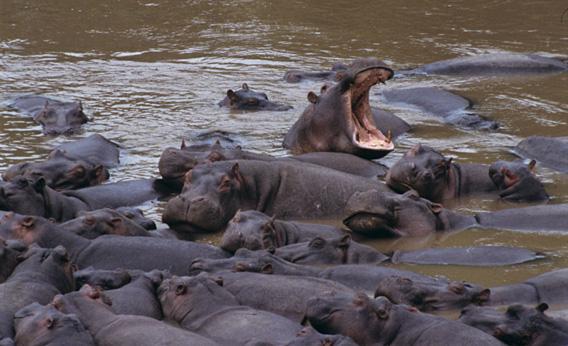A South African hippopotamus known as Solly died today after spending three days trapped in a swimming pool. Solly had reportedly been forced out of his herd by more dominant male hippos. How contentious is hippopotamus society?
Pretty contentious, but mostly among males. Hippos congregate in herds (also known as pods) that usually include 10 to 15 individuals, though some herds are much larger. Each herd is presided over by a dominant male; the other members of each herd are mostly females (with which the dominant hippo has mating rights) and young hippos, with a few submissive males. When young male hippos reach a certain level of maturity, they’re typically kicked out of the herd by the dominant male. When two male hippopotamuses fight, they open their mouths wide, sometimes lock jaws with one another, grunt stylistically, and slash one another’s hides with their enormous, sharp canines.
It’s rare for a challenger male hippo to take over a dominant male hippo’s herd. More often, a submissive or young male will join a herd of bachelors and bide his time until he can attract a herd of his own. It’s also extremely rare for adult hippos to kill one another, since their mouths aren’t big enough to fatally gore another hippo’s body. It’s possible, however, for adult male hippos to commit infanticide of other males’ offspring. Infanticide allows male hippos to maximize their reproductive success: Once a mother’s baby is out of the picture, she becomes ready to mate again sooner.
Hippos are territorial in lakes and rivers, where they spend the majority of their time. (They’re not territorial on land, where they graze at night on grass.) They mark their territory by spinning their tails to spew their urine and excrement over as wide an area as possible. Since hippos can die if they spend too much time out of water, they’re more likely to defend their territory aggressively during droughts and in places where water conditions are variable. They’re also more likely to show aggression toward other animals and humans in areas with a history of hippo poaching.
Hippopotamuses are difficult to study in the wild, both because they tend to attack humans who get too close to them and because so much of their lives take place underwater. They communicate vocally underwater and mate underwater. They don’t appear to form close bonds, with the exception of the bonds between mothers and their young offspring. Hippos typically leave the water only to graze, though they don’t have to graze every night to maintain their strength. However, the combination of undernourishment and stress certainly played a large role in Solly’s death.
Got a question about today’s news? Ask the Explainer.
Explainer thanks ecologist Rebecca Lewison of San Diego State University.
